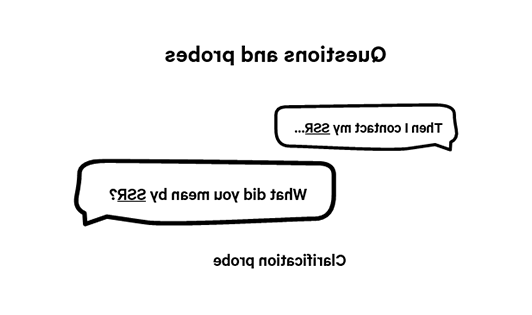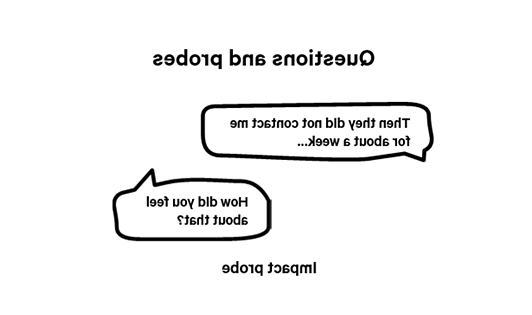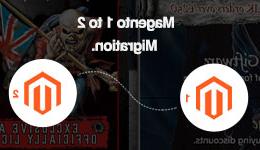
There are many factors that constitute a successful user interview, 从建立融洽的关系到确保你找到了合适的人.
如何ever, 一旦参与者端着一杯茶站在你面前(无论是通过屏幕还是面对面), then your research questions become the most important thing of all.
用户访谈可能是你在研究中可以使用的最定性的方法之一. It allows you to understand the reasons behind certain behaviours, 而不是仅仅通过定量方法来识别行为.
提出正确的问题是从你的研究中获得最大收益的关键——这不仅仅是十大网博靠谱平台背景. 如何 你对问题的措辞可能是收集模糊的见解还是贴满一整面墙的便利贴的区别.
From our experience with user interviews at Code, 我们收集了一些重要的建议,帮助你向参与者提出正确的问题.
Avoid asking leading questions
During everyday conversations, 我们中的许多人在使用引导性问题(这种问题可能会促使某人以某种方式回答)时不会犹豫。. 它们是我们日常聊天中很自然的一部分,我们经常不加思考或有意识地说它们.
Therefore, 在用户面试中避免问引导性问题一开始可能会觉得不自然和尴尬(我们都在Code上犯过错误)!). It just takes time and practice.
These are the kind of questions that could prompt a biased response:
如何 easy is it to find what you’re looking for?
By referencing the word ‘easy’, 这个问题可能会使参与者倾向于认为它应该很容易, therefore swaying their response.
一个更好的问题应该是,“你想在这页上找什么??”
Would you choose the first option?
Naturally, 人们通常更喜欢对似乎是首选的事情说“是”. If you focus on the ‘first option’ as the facilitator, 然后参与者可能会相信这是隐含的“正确”答案.
A less-biased question would be, “如何 would you proceed?”
Be impartial
Avoiding leading questions is just one part of being impartial. 最好避免与参与者分享你自己的经历, 因为这可能会鼓励他们稍微不同地回答问题.
在介绍阶段随意地分享一下是可以的(毕竟我们是人类)!).
Refer back to your research aims
在会议期间把你的研究目标交上去是个好主意, regardless of how many times you’ve read them before. 回顾他们的实际行动将帮助你检查你是否涵盖了正确的问题.
为了建立我们对Code的研究目标,我们使用这个简单的框架:
We are researching… [a product/journey]
For… [user demographic]
So that… [achievement or outcome]
Here’s an example:
We are researching… people’s experiences of different working environments
For… people who work in or are looking to work in tech
So that… we can create a working environment that attracts the best talent
Don’t be limited by your script
准备发言稿是确保你提出正确的问题并从会议中实现你的研究目标的最好方法之一.
如何ever, 不存在完全按照脚本进行的用户访谈(那该有多无聊啊)?). 参与者见解的不可预测性可能会迫使你偏离一条意想不到的道路,问一些不同的问题.
这并不是一件坏事——除非你完全偏离了方向,找不到回去的路! 把你的剧本想象成一根松紧带——你可以轻轻拉开, 但你最终还是需要拉回来,否则橡皮筋就会断裂.
Use probes to gather further insights
探查是一种成熟的研究技术,可以帮助你从参与者那里收集更多的信息.
有时,参与者可能会告诉你一件事,但实际上是另一回事. Or, they might tell you about what they did but not about 为什么 they did it. Using the right probe can help you to dig a little deeper.
Clarification probe
Clarification probes are useful when:
- The participant’s answer was unclear or ambiguous
- 参与者正在讨论一个敏感的话题(这可能会让他们更难表达自己想说的话)

Explanatory probe
Explanatory probes are useful when:
- You want to understand what motivates your participant to do things
- You want to understand the impact something had on the participant

Impact probe
Impact probes are useful when:
- You want to find out more about the participant’s emotional response
- You want the participant to elaborate further about an experience

Reflective probe
Reflective probes are useful when:
- You want to clarify the participant’s understanding without any bias
- 你要鼓励参与者在没有你参与的情况下详细阐述

Challenging probe
Challenging probes are useful when:
- 你要确保参与者告诉你的没有矛盾之处
- 你认为参与者可能会对你的问题或测试感到困惑

Just to recap…
- Avoid asking leading questions
- Be impartial
- Refer back to your research aims
- Don’t be limited by your script
- Use probes to gather further insights
掌握上述所有内容很大程度上需要经验,即使如此, it’s natural to slip up occasionally. 用户访谈可能是你可以使用的最个人化的研究方法之一,尽管它的目的是什么, will always be conversational. Therefore, 如果你问了一个引导性的问题,或者分享了你自己的偏见,这绝不是失败, 你应该意识到这一点,并在下次面试中意识到这一点.
Need help your vision or product strategy? We’d love to hear from you.







